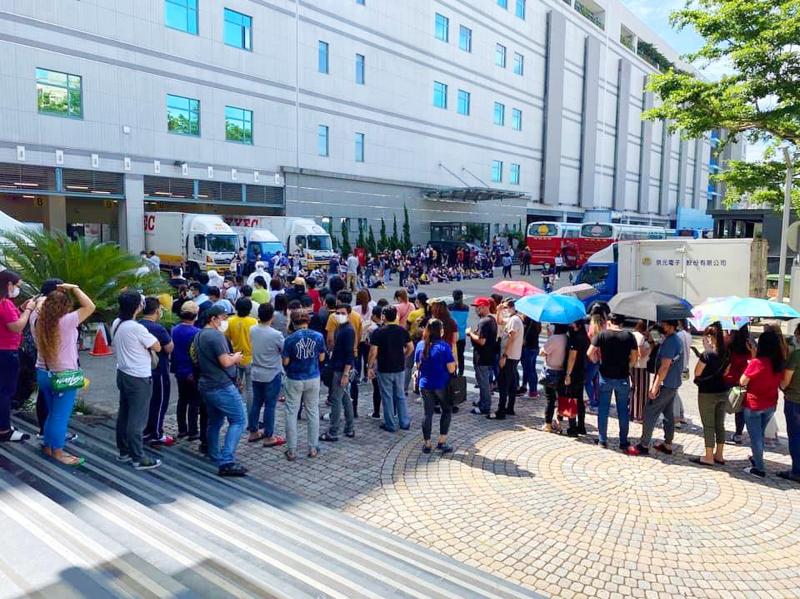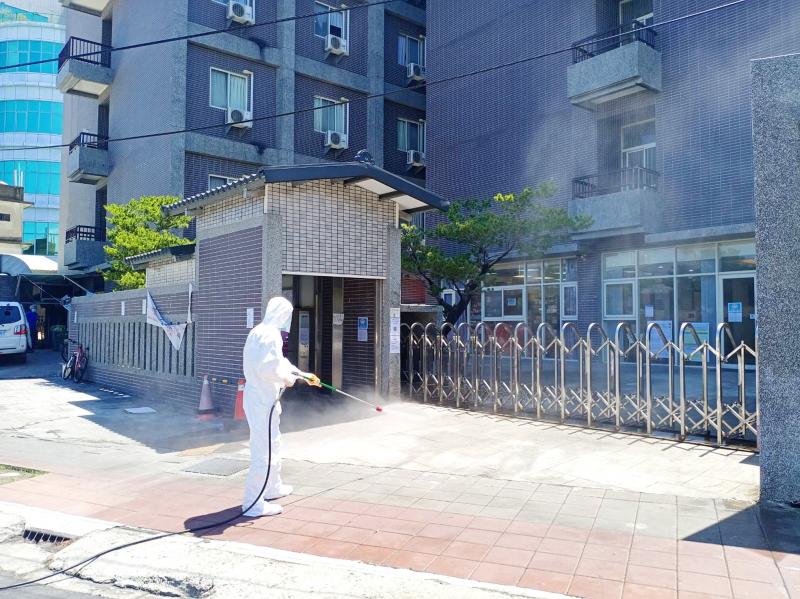By the end of last year, over 150,000 migrant workers in Singapore had been infected with COVID-19, roughly 47 percent of its migrant worker population. Their lives, already under harsh control in situations worse than in Taiwan, came under even stricter rule. Whole dorms were quarantined and even healthy workers were allowed out only infrequently, to shop in designated shops and, of course, to work. To its credit, the government did force employers to pay workers, and gave them medical care and support.
Yet, in the end, the Singapore worker outbreak underwrote even tighter controls on the migrant worker population. Many of us have been fearing that outcome here in Taiwan.
Last week there were two outbreaks among migrant workers at different companies. These cases signal that we could be on the cusp of a Singapore-like disaster, with workers overwhelmed by the virus, threatening everything from human lives to Taiwan’s economy and place in the global supply chain.

Photo courtesy of a member of the public
Government officials have repeatedly averred that keeping the economy ticking along is an important priority in getting the nation through this crisis.
Prove it: vaccinate migrant workers. Now.
It is long past time to move migrant workers to the top of the priority list, after health care workers and other at-risk populations, for vaccination. And it should be free — use the 1.2 million doses of vaccine that Japan is sending us. There is hardly a more threatened population in Taiwan.

Photo courtesy of the Miaoli County Environmental Protection Bureau
INVISIBLE, BUT PRESENT
Migrant workers in many ways are a population known to exist, yet somehow invisible. Ghettoed in their own communities surrounding dorm areas near industrial districts, we hardly see them. They have their own eateries and shops, where they buy their own products from their home countries, right? Their own churches and community centers, no? They are isolated from us, right?
Nope.
Last week the news broke of a cluster of cases at the King Yuan Electronics Co’s dorm in Miaoli County’s Jhunan Township (竹南). That cluster is an excellent example of how the migrant worker population is not a population that is isolated from the mainstream, but part of it.
In Zhunan there is a small shopping mall that is a magnet for the towns around it. King Yuan workers go there to enjoy themselves, and to a large market where they go to buy food. They go out to the same restaurants, stay at the same hotels and shop in the same popular chain stores as the locals.
Who hasn’t seen the Sunday trains filled with workers going traveling across Taiwan to meet friends and relatives? Same as the locals.
These regular contacts in migrant worker spaces like ASEAN Plaza in Taichung or the Taipei Main Station bring together not only people from different dorms, but also mingle caregivers and factory workers with restaurant personnel and their Taiwanese suppliers. The migrant worker communities are thus heavily networked and can easily spread the virus from one place in Taiwan to another.
Many migrant workers have illegal second jobs, often cleaning or serving local businesses and homes. There is also an enormous population of runaways, working in factories, on farms in the mountains and in brothels, who naturally stay in touch with their own communities and who also have regular contact with the local population.
MIGRANT-TAIWANESE INTERACTION
Understanding how interconnected the migrant worker population is, after the cluster was revealed, migrant workers in other companies were immediately given forms asking if they had been in contact with workers at King Yuan. Other companies have asked their workers to remain in their dorms, offering free food and other perks in compensation.
Romantic relationships are common. There is a whole subculture of locals married to former migrant workers. Naturally foreign spouses maintain contact with their former worker communities. Many of them operate little shops and restaurants that cater to that population, switching back and forth between the two worlds of the mainstream population and the migrant population.
They also interact in other ways. Around areas where workers congregate there are cheap rooms to let, sometimes just for a night, often for long-term. For example, a friend of mine rents a room with her boyfriend (who works at another firm in the next city) next to the train station, one stop from her dorm. Every morning she takes the train back to her dorm, buys breakfast on the way and then takes the bus to the factory, interacting with many others along the way.
Their relationship is thus an intimate link between two otherwise separated dorm populations and the local area. Such arrangements are common.
MIGRANT-EXPAT INTERACTION
Like myself, many expats in Taiwan are dating migrant workers. Our two heavily networked populations thus interact, overlapping with everyone we come into contact with.
So what? This just means that migrant workers are like all other humans in Taiwan, then, right?
Migrant workers have two crucial differences from the rest of us. The first is that when the rest of us go home at night, we go back to an apartment that we share with a few other people, often with rooms to ourselves. An outbreak in our home can be contained.
By contrast, migrant workers return to dorms that they share with hundreds of others, sleeping six or eight to a room. Spaces in dorms, like kitchens and leisure areas, are shared spaces. One infected person can easily infect scores.
MIGRANT WORKERS CRITICAL TO ECONOM
The other crucial difference is that few of us are important to the economy either individually or collectively. But it would be a severe problem for global supply chains if several key tech firms in Taiwan found their migrant worker populations unable to work because of COVID-19.
King Yuan is not a household name like Taiwan Semiconductor Manufacturing Co (台積電) or Asus, but it is globally prominent in its testing and assembly markets.
Another issue should be pondered. Beginning last year, as the government rolled out surveillance techniques for COVID-19 cases, civil society organizations in Taiwan began protesting that these were anti-democratic. Migrant workers are already a heavily restricted, surveilled and tracked population. In many dorms, for example, workers must fill out a form when they go out overnight, and dorms are electronically gated. Some workers are not allowed out overnight at all.
Guess what: migrant worker surveillance is population surveillance. It is a truism of history that surveillance techniques developed to monitor marginal populations will inevitably leak into use against the mainstream population, which was fine with such treatment when it was applied to the Other. Racism, after all, was invented so the authorities could control both sets of populations, the marginal and the mainstream.
Already we must swipe a QR code for the places we visit — even taxis and betel nut stands have them now. What will happen to this enormous pool of data the government has acquired on our social and consumption habits? What further potential is there for abusive control in anti-pandemic measures?
My guess is the government will promise not to do anything anti-democratic with that data, as governments always do, and then use these techniques and the data they gather in ways the population would not approve of, if it knew. The temptation is too great even for the most democratic of governments.
Vaccinating the migrant workers would address all of these issues. It would protect the economy, save human lives and reduce the trend toward authoritarianism inherent in surveillance by making it less necessary.
Let’s do it. This week.
Notes from Central Taiwan is a column written by long-term resident Michael Turton, who provides incisive commentary informed by three decades of living in and writing about his adoptive country. The views expressed here are his own.

Jacques Poissant’s suffering stopped the day he asked his daughter if it would be “cowardly to ask to be helped to die.” The retired Canadian insurance adviser was 93, and “was wasting away” after a long battle with prostate cancer. “He no longer had any zest for life,” Josee Poissant said. Last year her mother made the same choice at 96 when she realized she would not be getting out of hospital. She died surrounded by her children and their partners listening to the music she loved. “She was at peace. She sang until she went to sleep.” Josee Poissant remembers it as a beautiful

For many centuries from the medieval to the early modern era, the island port of Hirado on the northwestern tip of Kyushu in Japan was the epicenter of piracy in East Asia. From bases in Hirado the notorious wokou (倭寇) terrorized Korea and China. They raided coastal towns, carrying off people into slavery and looting everything from grain to porcelain to bells in Buddhist temples. Kyushu itself operated a thriving trade with China in sulfur, a necessary ingredient of the gunpowder that powered militaries from Europe to Japan. Over time Hirado developed into a full service stop for pirates. Booty could

Lori Sepich smoked for years and sometimes skipped taking her blood pressure medicine. But she never thought she’d have a heart attack. The possibility “just wasn’t registering with me,” said the 64-year-old from Memphis, Tennessee, who suffered two of them 13 years apart. She’s far from alone. More than 60 million women in the US live with cardiovascular disease, which includes heart disease as well as stroke, heart failure and atrial fibrillation. And despite the myth that heart attacks mostly strike men, women are vulnerable too. Overall in the US, 1 in 5 women dies of cardiovascular disease each year, 37,000 of them

Politically charged thriller One Battle After Another won six prizes, including best picture, at the British Academy Film Awards on Sunday, building momentum ahead of Hollywood’s Academy Awards next month. Blues-steeped vampire epic Sinners and gothic horror story Frankenstein won three awards each, while Shakespearean family tragedy Hamnet won two including best British film. One Battle After Another, Paul Thomas Anderson’s explosive film about a group of revolutionaries in chaotic conflict with the state, won awards for directing, adapted screenplay, cinematography and editing, as well as for Sean Penn’s supporting performance as an obsessed military officer. “This is very overwhelming and wonderful,” Anderson